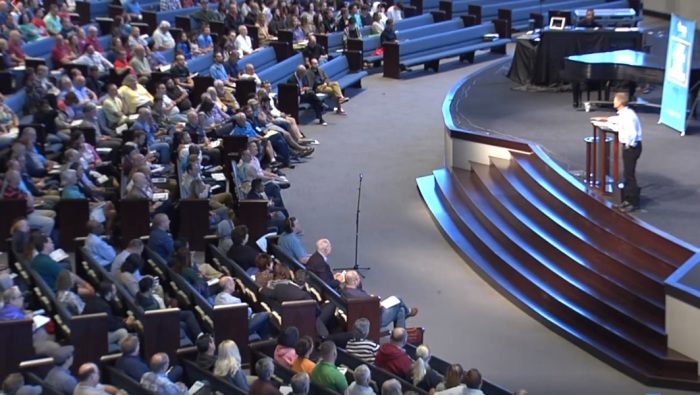Apologist Chip Ingram lists 5 relationships key to Christian discipleship

Chip Ingram, apologist and president of Living on the Edge, says there are five relationships that are key to proper Christian discipleship.
Speaking at the Southern Evangelical Seminary’s 26th annual National Conference on Christian Apologetics in Charlotte, North Carolina, over the weekend, Ingram explained that Romans 12 lays out five relationships that are integral to Christian discipleship: a relationship with God, a relationship with the world, a relationship with oneself, a relationship with believers, and a relationship with nonbelievers.
“This is the Reader’s Digest version, this is the Cliff’s Notes, this is the Instagram picture of what a disciple is in summary,” Ingram said.
“It’s not all there is on what a disciple is, but in a measurable, practical, grace-oriented way, [the Apostle Paul is] going to define your relationship with God, the world, yourself, believers, and unbelievers.”
When it comes to a relationship with God, Ingram said God “wants you, all of you,” and warned that “if you’re not completely surrendered in every area of your life, you will not experience God’s power.”
“His power works,” Ingram stressed. “Jesus said, ‘you cannot be My disciple unless you love Me more than father, mother, and brothers and sisters.’”
A contrast was the next relationship, the one with the world, which Ingram said involves “being separate from the world.” To justify this, Ingram quoted Romans 12:2, which says in part “do not conform any longer to the pattern of this world …”
The third relationship, the one about the self, Ingram said Christians should be “sober” in their self-assessments, warning against thinking too high or low of oneself.
“God says, ‘I want you to think accurately, soberly,’” he continued. “’I want you not to think that you’re better than other people, I don’t want you to think “I’m worthless, I’m no good.” I want you to think of yourself the way I think of you.’”
This assessment, Ingram stressed, involves values that include both “strengths and weaknesses,” as well as “different gifts” to serve the church.
The fourth relationship is with fellow believers and involves “serving in love,” which helps a Christian to “experience authentic community.”
The final relationship is with unbelievers and is centered on “responding to evil with good” and, citing Romans 12:17, which reads in part “never repay anyone evil for evil.”
Ingram also spoke about the need to rethink apologetics, noting that a major problem for evangelizing in the United States is that “the average person doesn’t even want to hear about your faith.”
“How are followers of Jesus to live winsome and attractive lives in an ever-turbulent 21st century?” he asked the audience.
“How do you live that life that’s measurable, that’s grace-oriented, that’s relational, so that people would be asking us and your children, and the people in your small group, and the people in your church, ‘would you please tell me about the hope that’s in you?’”
Ingram declared that while “you need to be able to answer all the philosophical, archaeological, biblical questions about your faith,” nevertheless Christians “need to live the kind of lives that are so radical, so different, so winsome, so loving” that non-Christians take note with interest.
“Live such radically pure [1st Peter chapter one] and loving — end of chapter one — lives and suffer in such a way, where you don’t return evil for evil, that people would scratch their head and say, ‘you know, I’ve heard they’re really weird, but there’s just something about them,’” he added.
“’In a world of chaos and violence and hurt, they have peace and they have joy, and they love one another, and there’s something unbelievably attractive about these followers of Jesus.’”
The Southern Evangelical Seminary’s 26th annual National Conference on Christian Apologetics was held Oct. 11-12 at Calvary Church. The theme for this year’s conference was “Why Truth Still Matters” and had approximately 1,800 attendees, the SES said Tuesday.
Other speakers for the conference included radio host and author Michael Brown, Liberty University professor Gary Habermas, astronomer and Reasons to Believe President Hugh Ross, and SES President Dr. Richard Land.




























